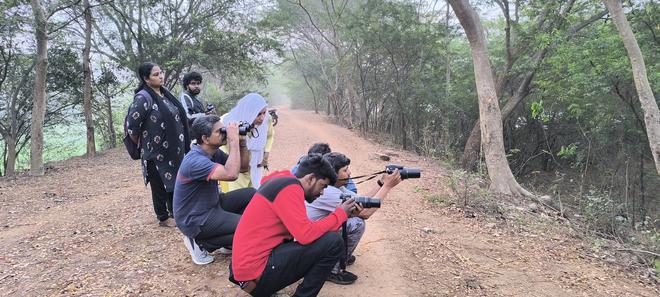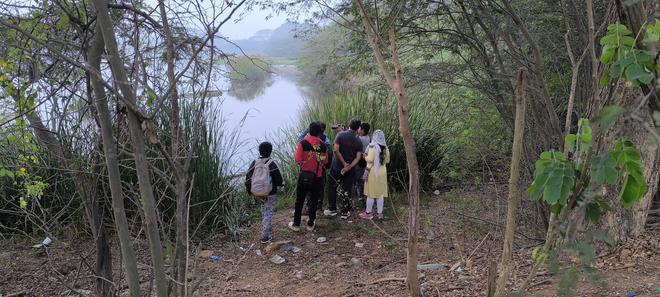Every year in February, birding enthusiasts across the globe come together to spend time over a span of four days to take part in a massive exercise of documentation called Great Backyard Bird Count (GBBC). The groups visit their favourite places watching birds, identifying them, counting them and submitting their observations in an online database. Over the years, the GBBC has helped scientists to better understand and protect birds around the world in this biggest global bird counting exercise.
In India this year, Andhra Pradesh was among the top 10 States that recorded the highest bird species in the country during the GBBC held from February 16 to 19. While West Bengal topped the list with 533 species followed by Uttarakhand (419 species) and Assam (413 species), a total of 321 species were recorded in Andhra Pradesh and a staggering 1,155 complete checklists were submitted on eBird, an online database platform, by birdwatchers around the State.

“The overall participation has been stable and we have a couple of new regional records. More than 50 birders from across the State participated. We have the preliminary results now at the end of the four-day exercise; detailed results will be out later in March,” says Raja Bandi, the Andhra Pradesh coordinator for GBBC.
Chittoor bagged the first position in Andhra Pradesh by recording 214 bird species, followed by East Godavari and West Godavari and Prakasam districts. Meanwhile, Visakhapatnam stood sixth in the State with a total of 136 bird species recorded from the region and 380 checklists were submitted on eBird.
Among the educational institution campuses, Indian Institutes of Science Education and Research (IISER) Tirupati and Rishi Valley School, Madanapalli, recorded the most number of species with 134 and 88 respectively. Incidentally, the eBird team of Cornell University visited IISER Tirupati on the last day of GBBC and Campus Bird Count.
This year also saw enthusiastic participation from women with institutions like CR Reddy Women’s College and Padmavathi Mahila Viswa Vidyalayam, Tirupati, recording birds from the campuses.
The Vijayawada Nature Club recorded the common buzzard from the city for the first time. Steppe Eagle, a large eagle and an endangered species, was recorded from Anantapur. Tawny eagle, another large eagle whose population is known to be rapidly declining across the country (as per the State of India Birds 2023 report), was also recorded from Anantapur.
Species of open habitats that are of priority conservation concern were mostly recorded from Anantapur. “This underlines the importance of the open scrub and grassland habitats of Anantapur which need immediate attention,” says Raja. Most of the forest birds recorded are from Seshachalam and Papikonda. Visakhapatnam birdwatchers recorded good diversity of wetland and shore birds.
“It’s a great way to connect with Nature and step out into our neighbourhood to observe birds. What’s interesting to note is how the global map lights up in the region when we submit our counts; we know our data matters,” says Yagnapathy Adari, district coordinator, Visakhapatnam, for GBBC 2024.

The annual bird counting exercise in Visakhapatnam was conducted by a group of bird enthusiasts, birdwatchers along with a few local NGOs and WWF-India in association with the Andhra Pradesh Forest Department. Pre-scheduled walks were held throughout the city covering most of the habitats, forests, water bodies and estuaries. Birdwatchers Vivek N Rathod, Janardhan Uppada, Yagnapath Adari, Prem Swaroop Kolluru and Ashok Kolluru were among the top five observers in Visakhapatnam. Meghadrigedda downstream recorded 16 species, the maximum number of species from Visakhapatnam.
Bringing an element of surprise for the birders was the chance sighting of the ‘Near Threatened’ species of a pallid harrier at Podugupalem Lake. The last time it was recorded in eBird was in 2020.
“Once people get involved in birdwatching as a hobby and try to learn about the different species of birds, their behaviour, their habitat, we will have the complete data of all the locations covering hills, valleys, streams, different waterbodies. There are also many education institutions that have huge land area and are unexplored,” says Vivek Rathod, a birding enthusiast.
This year a member from Vizag Bird Watchers Society, Sourav M covered the campus of Naval Science & Technological Laboratory (NSTL), which is a restricted place for the public. Similarly, participation came from Gitam University and Andhra University as well.
Among some of the interesting observations were a pair of white bellied sea eagles, chestnut headed bee eaters (a winter migrant), a pair of Indian gray hornbill at Indira Gandhi Zoological Park. At Podugulapalem lake, an uncommon lutino parakeet, pallid harrier, a huge flock of cormorants feeding on fishes were sighted. Gulls, plovers, curlews and whimbrels were also sighted in Visakhapatnam, among other species.







